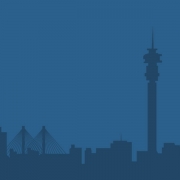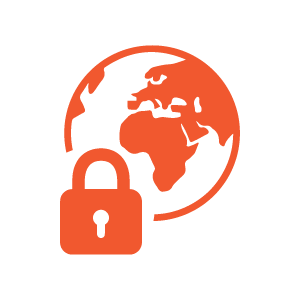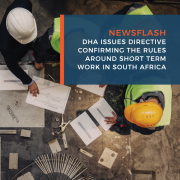Early success of Points-Based System holds promise for attracting foreign talent to SA
/in Xpatweb News /by xp-adminApplicants can even score themselves to see if they would qualify before submitting and application, he said in a recent podcast on important immigration reforms hosted by Xpatweb.
Mbhele told Marisa Jacobs, Managing Director at Xpatweb, the DHA did an analysis of applications received during the first three months the PBS has been in place, compared to the immediate three-month period before the system was introduced.
It is early days, but the improved compliance bodes well for visa application approvals in the coming months as applicants will become more familiar with the system and understand the requirements better. Mbhele is confident there will be an increase in the number of General Work and Critical Skills Work Visas issued to foreigners to work in South Africa. This in turn, will create more employment opportunities in the country.
Mbhele said: “After a full year of having the points-based system in place, the benefits will speak for itself.”
Benefits to corporates
The PBS is expected to significantly benefit corporates seeking to attract international critical skills to South Africa. For years, businesses have expressed frustration over the challenges of bringing in foreign talent to enhance their operations. Previous legislation and requirements made it difficult to initiate or plan projects effectively, as companies could not be certain that the highly skilled professionals they needed would secure the necessary visas.
Jacobs agreed that by offering a structured and objective evaluation, the PBS ensures that applications are assessed on clear and measurable criteria as it awards certain scores to applicants based on qualifications, work experience, salary, and language proficiency.
Mbhele said especially employers who have tight project deadlines need certainty and clarity when they plan to onboard a new employee and go to lengths to recruit a person from abroad, well-knowing the person will be granted the necessary visa.
Beyond the negative impact on business operations and profitability caused by delays in securing critical skills, it is important to recognise the human aspect of each application. Prospective employees should not be left in limbo, uncertain about the outcome of their visa applications. Additionally, every rejected or delayed application creates a domino effect, affecting accompanying family members who may, for example, lose placement at their preferred school due to prolonged visa processing times.
Ongoing monitoring
The DHA constantly monitors and evaluates the PBS to determine any common thread in the rejected applications. The DHA will establish where these applicants fall short and if the PBS is really helping the department in addressing the issues identified, Mbhele said.
As time goes by, a better understanding by DHA officials, employers and immigration service providers who use the PBS to bring in foreign talent, will help minimise the issues flagged by corporates up to now, such as inconsistencies in adjudication.
Background to implementing the PBS
During an extensive review of the work visa processes in South Africa in 2022, Operation Vulindlela found for a Critical Skills Work Visa, an applicant had to comply with more than 20 requirements. Even missing just one, would lead to a rejection.
Operation Vulindlela also expressed concern about an inconsistency in the adjudication of applications depending at which Home Affairs mission or embassy the application was submitted. Often very similar applications resulted in different outcomes.
The report indicated either DHA officials were applying the law incorrectly or officials introduced additional requirements that applicants were unaware of prior to them submitting the application. Operation Vulindlela recommended that DHA introduce a system, what we now know as the Points-Based System, to simplify and ensure transparency and bring predictability in the visa adjudication process.
How to get to the 100 points required for a Work Visa
The PBS award a specific number of points to an applicant for required documents submitted as part of the application. Once the score reaches at least 100 points, they qualify for the visa.
The main aim of the PBS to take out ambiguity about the requirements to be considered and how many points each set of criteria gets awarded.
Here is a quick summary of the categories:
An occupation on the Critical Skills List scores 100 points, but the PBS applies more broadly, aiming to attract a wide range of talent who can contribute to South Africa’s businesses, Jacobs said.
Qualification, evaluated at the required level (NQF levels 9 & 10; or levels 7 & 8)
Mandatory offer of employment
Remuneration (ZAR 976,194 gross p.a.; or between ZAR 650,976 and R976,194 p.a.)
Work experience (5 – 10 years; or 10+ years)
Employment status (an employment offer from a company recognized under the Trusted Employer Scheme (TES) will score extra points)
Proficiency in at least one official language (includes English)
In closing
At the time the PBS was gazetted, Minister of Home Affairs Dr. Leon Schreiber, said this system for Work Visas amounts to the single most progressive and pro-jobs regulatory reform South Africa has seen in decades. With research commissioned by the Reserve Bank and the International Food Policy Research Institute showing that an enhanced Visa regime can create seven new jobs for every additional skilled worker attracted into the economy, the PBS is indeed among the most important regulatory changes in the immigration space.
(The podcast can be accessed here: Part 3 of 3 | Immigration update with DHA | Points Based System for Work Visas )















